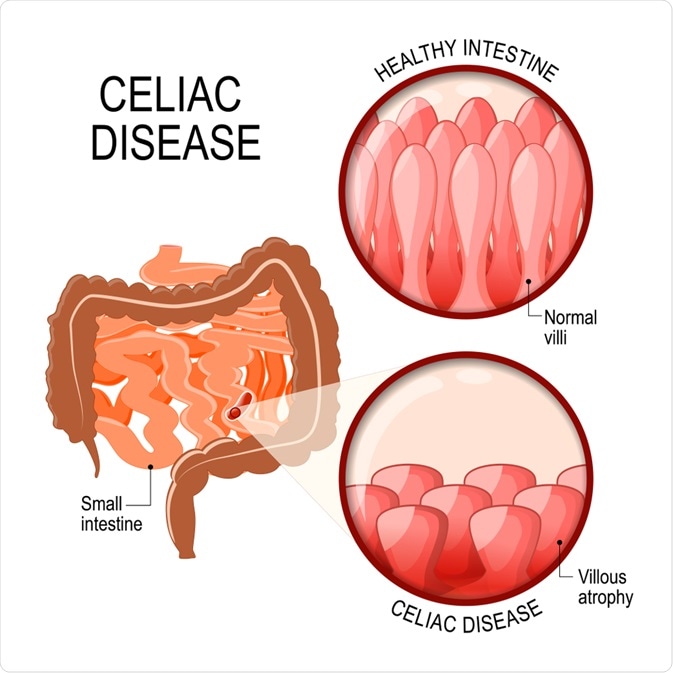Gluten intolerance or allergy is associated with a sensitivity to gluten, which is a substance found in staple foods such as wheat and barley. Gluten provides elasticity to dough and also helps the dough to rise.
Some of the major disorders that are related to gluten sensitivity include celiac disease (CD) and non-celiac gluten sensitivity (NCGS). Gluten-related disorders are on the rise across the globe.
Symptoms of gluten sensitivity
5 Signs and Symptoms of Gluten Intolerance
The symptoms of a gluten sensitivity can vary greatly between each affected individual. When a gluten sensitivity develops during infancy, symptoms can include failure to thrive, developmental delay, abdominal distention, and sometimes severe malnutrition.
Beyond childhood, a gluten allergy can manifest as gastrointestinal problems such as diarrhea, constipation, gastritis, bloating, belching, as well as other symptoms such as fatigue, joint pain, dyspepsia, anemia, weight loss, and depression.
CD
CD, which is also known as gluten-sensitive enteropathy, is an autoimmune inflammatory disease affecting the small intestine. Studies have shown that about 1 in every 250 people in the US suffers from CD. A diet free of gluten has been shown to reverse most of the effects of this disease. Patients are serologically tested for antibodies against transglutaminase, endomysium, and gliadin.
‘Silent’ CD, which is associated with very few or no symptoms, is also a common health condition. Many patients who were identified as having CD in seroprevalence studies did not show any symptoms of the disease. However, asymptomatic patients are at equal risk of complications related to CD, Therefore, people with a family history of gluten-sensitive enteropathy are at a greater genetic risk of CD and therefore need to be tested.

Image Credit: Designua / Shutterstock.com
The timely diagnosis and treatment of CD are crucial to prevent grave consequences of the condition such as osteoporosis and even cancer. CD is almost always associated with anemia; in fact, approxiamtely 50% of patients with CD are found to be anemic. Iron malabsorption is very common in people with CD, as iron is normally absorbed in the proximal small intestine. Folate and vitamin B12 deficiency can also be present but are less common.
Dermatitis herpetiformis, which affects less than 10% of adults with CD, is a skin condition that is often misdiagnosed as nonspecific dermatitis or atypical psoriasis. Dermatitis herpetiformis causes intensely pruritic rashes and is typically seen in the back, elbows, and knees. Moreover, the lesions appear similar to those of herpes simplex, which is why the name “herpetiformis” has been used to describe this specific condition. A skin biopsy is the common diagnostic tool used to detect dermatitis herpetiformis.
NCGS
NCGS is a disorder that causes both intestinal and extra-intestinal symptoms to arise following gluten ingestion in people with no CD or diagnosed wheat allergy.
Studies have shown that NCGS is usually associated with neuropsychiatric disorders such as autism and schizophrenia. About 18 million Americans are estimated to have NCGS. Due to the lack of biomarkers available for clinical studies, NCGS is still not fully differentiated from other disorders related to gluten intolerance.
Gluten-free diet
A gluten-free diet aims to avoid foods made up of or containing wheat, rye, and barley, as well as their derivatives including brewer’s yeast and malt. Some of the safe substitutes for these common ingredients include rice, maize, quinoa, corn, potato, tapioca, beans, and nuts.
Many gluten-free products are commercially available, of which include bread, chips, cookies, and cereals. Support groups also exist to provide valuable information about gluten-free food products to affected individuals and their family members.
People on a gluten-free diet can still eat healthily by eating normal amounts of vegetables, fruits, meats, fish, nuts, and beans. Moreover, these individuals can also switch to a wide range of alternative products such as amaranth, buckwheat, cornstarch, pea flour, millets, potato flour, and soy flour. However, each of these grains is often grown and milled in nearby areas and is therefore at a high risk of cross-contact. Even minute amounts can be dangerous to the small intestine of people with a high degree of gluten allergy.
Although oats do not contain gluten in their natural form, there can be traces of gluten in commercially available oats due to cross-contamination. Therefore gluten-sensitive people should apply caution before ingesting oats.
References
Further Reading
Last Updated: Mar 21, 2021